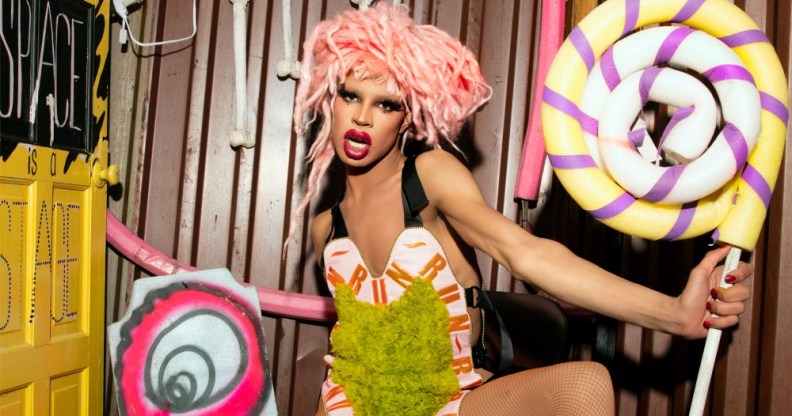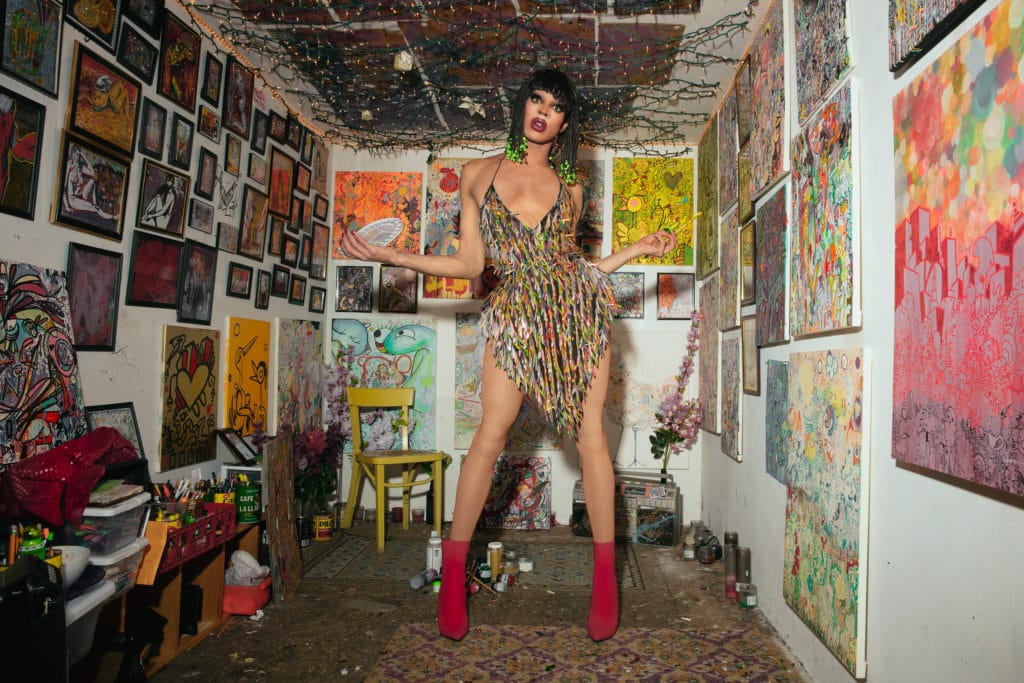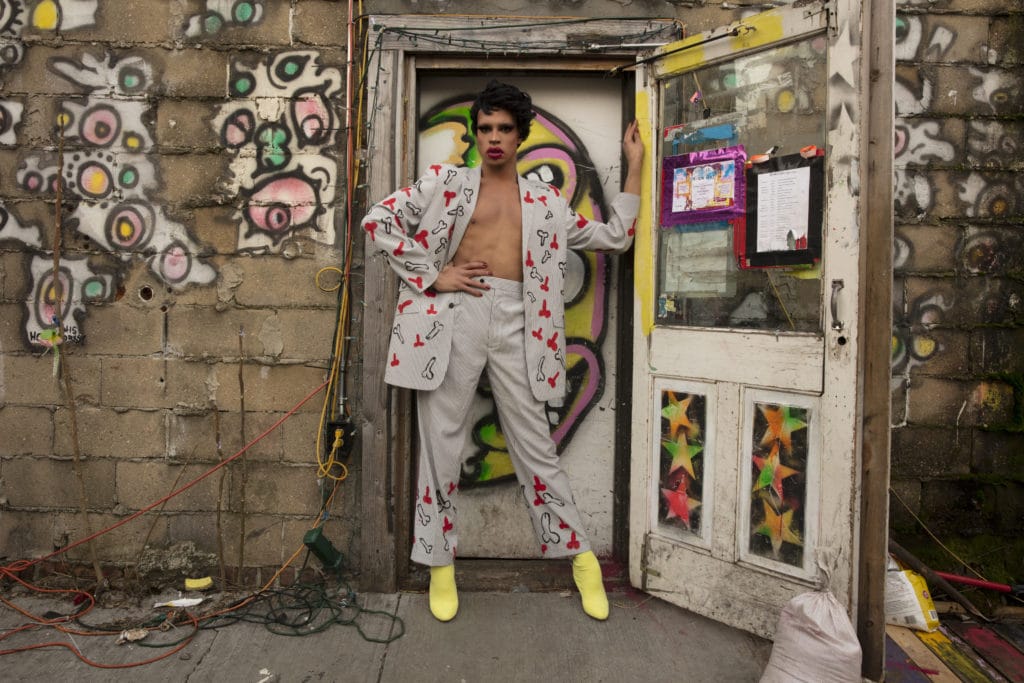Yvie Oddly on launching a rap career: ‘Fans want young, white, expensive queens. I was handed a different set of cards’

Yvie Oddly is carving her own path. (Big Picture Media)
Yvie Oddly was never going to follow the typical Drag Race winner’s route.
Since contorting her way to the crown in 2019, Yvie’s career has been – well, odd.
Her incredible talents have been celebrated time and again within the RuPaul empire, earning her a prompt invite back to lip-sync as part of the All Stars 5 assassin twist (showing up several seasoned competitors in the process) and a spot on the massive Drag Race Live! in Vegas show.
But Yvie has been open about the fact that out in the wild, the fandom hasn’t taken to her as much as they have her predecessors. She’s grateful for the support she has received, and certainly isn’t one to whine, but there’s no denying that as an outrageously charismatic queen responsible for some of the franchise’s most iconic moments, Yvie hasn’t been given her dues by fans.
Be it down to the colour of her skin, her often lo-fi aesthetic or her unconventional (by Drag Race standards) style, there’s something odd about the way Yvie has been received.
Her latest project is a way for her to “reclaim [her] space”, to “carve out a path” all her own. Yvie has turned raptress, dropping her first album Drag Trap. As she explained to PinkNews, it’s a melding of her dual identities as a Black queer person, a bold statement that you can be both, at the same time, without compromise. Just as importantly, it’s full of bops.
PinkNews: The album’s called Drag Trap, tell me all about it.
Yvie Oddly: It comes from basically my whole goal with this album, which is to help create more spaces in hip-hop for queer kids, since both the queer community and the hip-hop community are kind of at odds and have never really been integrated that well with each other. And while I’m far from the first LGBTQ person to rap, I want more people to feel comfortable, listening to music that they like with and feeling like there’s that space for them.
Drag Trap is combining both of my worlds – especially since I came up grinding. I’ve been doing drag for a decade. And my house was known as the drag trap, because that’s where everyone would come and get ready and make things for their shows. Trapping is all about grinding and I wanted my first album to commemorate that experience.

Yvie Oddly. (Big Picture Media)
It’s such a weird thing to be in that in intersection. The hip-hop community hasn’t always been the most welcoming to queer people, especially queer Black people, but the queer community also isn’t the most…
… accepting of culture that specifically is less white? Let’s lay it out like it is, hip-hop, even though it’s now an art form that has become more accessible for everyone, its roots come from Black culture, specifically here in in America.
And so there is this giant disconnect, where there’s rampant homophobia and transphobia in the hip hop community – they don’t want to f**k with us. But in the queer community there’s rampant racism and xenophobia, which is funny, because both of these are oppressed peoples, so you’d think you’d learn to be more sympathetic with other oppressed peoples. That’s why I’m doing what I do.
As you say you’re putting this out there to combat at all that, but as the person who is there in the middle, how do you deal with the s**t that comes from both sides?
I’ve always had to survive through a system of code switching, where if I’m around gay people I present gay, or if I’m around Black people then I kind of shove down the gayness and amp up the parts of me that really relate to Black people.
I sneak in, make friends and I’m like, pow! By the way, I’m Black! Pow! By the way, I suck d**k!
That’s how I’ve always had to navigate these different intersections of my identities, and I just don’t think it’s been such a healthy way to navigate through the world. But what it has helped me with is getting my foot in the door with so many different communities. If I were just 100 per cent of what I am flat out, they might be terrified to actually embrace somebody from that, so I sneak in, make friends and I’m like, pow! By the way, I’m Black! Pow! By the way, I suck d**k!
Relatable on many levels! Let’s talk about the music itself, when did you start working on it?
The first song I wrote right when I got back from Drag Race. We had obviously just done a musical challenge around the end of our season, and I honestly never thought of myself as a rapper or saw that as something I could do. But after going through that challenge, and really having fun playing with words, I just started writing immediately. As soon as I got back, I wrote [the single] “Dolla Store”. From there I’ve just been writing about all of my experiences in the past year, whether that be fame, or going out with the girls and having fun, to the loneliness and isolation that comes with this. And of course lots of bragging because you got to be a bad b***h.
Aside from Miss Vanjie [on the single “Hype”], are there any features we can look forward to?
I got to work with a handful of producers from all these different backgrounds, including a friend from high school who helped make like my first song for a science class in like eighth grade. But as far as this album goes, I wanted to put out as much solo, individual work as possible because I wanted to show people what I’m capable of by myself. But going forward, I would love to collaborate with a lot more people specifically in the music industry. It’d be a dream to work with Jungle Pussy or Rico Nasty, or any of the strong females in hip-hop. Any anything to queer things away from men having all the power in the world, from cis men just ruling everything.
It’s been a good year for women in hip-hop.
It’s been absolutely magical. A lot of people say: “People like Cardi B are setting the feminist movement back rapping about their vaginas.” I disagree. It’s taking complete ownership of the way the world has been – if women have been sex objects in the world, instead of being like, ‘I am a sex object and I’m yours to control.’ She’s like, ‘yeah, b***h I’m a sex object, and I’m my own sex object. And I’m my own pimp. And I’ve got to make my money’. I love watching a bad b***h break down barriers.
And actually, it kind of gives me a little bit of hope for my own endeavors, because a lot of the the transphobia and homophobia that does come in the hip-hop community is strongly tied to a lot of the misogyny that already exists there. So to see that women are finally breaking through and and not being the token female rap artist — that there’s a space for more voices, just shows me that maybe there’s a future for myself.

Yvie Oddly. (Big Picture Media)
You spoke recently about how you’ve maybe not been afforded the same opportunities as other Drag Race winners – whether it’s because they’re white, from big cities, because their style of drag conforms more. It feels like this project is a way of going: “F**k all of that, I’m striking out on my own.”
Honestly, this project has just been a way to reclaim my space. I know how whiny it sounds to say, “Oh, I didn’t get all the same opportunities as the queens who’ve already been nationally known, and in big cities and are white”. But the fact of the matter is that I did have a different set of cards handed to me, that made it very difficult for me to succeed in the traditional ways that Drag Race winners have done before.
And I knew that if I want to continue doing drag, I have to carve out my own path, specifically because I also just can’t keep physically performing the same way a lot of these queens can do for a long, lengthy career. So this is my way of exploring, being like, no wait, you deserve things, you are an artist, you are capable of doing things, even from your tiny little city [Denver, Colorado], even if you don’t have all the money in the world. And I just wanted to put my heart and soul into something purely, purely because I wanted to.
The fan base is inherently leaning towards really expensive queens, and skinny white youngness.
I would like to clarify, because people like to think that everything is about the production and how they set it up. But the show does its best to set everybody up for success, whether you’re out first or you won this season, it tries to introduce you to the world.
It’s just difficult because the fans and the fan base is inherently leaning towards really expensive queens, and skinny white youngness. Like those are traits that if you look at the numbers, of how all of us are doing out in the real world, those girls are succeeding. The closer you are to being a young skinny white fashion queen who looks really expensive, the more opportunities you’re going to have, the more of a platform you’re going to be given outside of the Drag Race world.
Drag Race and [producers] World of Wonder has done a really amazing thing in allowing me to go back to All Stars [as a lip-sync assasin], allowing me the opportunity to be one of the first queens on on the Vegas strip. My gripe was never with any of that, they’re doing a fantastic job of trying to highlight the beauty and talent and individuality that artists within their circle have. It’s just about getting the fans to do the same thing.
To wrap things up, I want to talk politics. You’ve got an election coming up, a Supreme Court seat that’s about to be filled, what are your feelings on the situation right now?
My thoughts on the political situation right now is that America has done a fantastic job of sweeping a lot of our issues and a lot of the little cracks in our system under the rug and ignoring them. And I think what we’ve seen through the last few years with our current president, is that all of those cracks are actually gigantic and deep, and that our democracy and our the system that we set up to hopefully better the future of this country, is all at stake and being easily dismantled.
Especially with the passing of Ruth Bader Ginsburg, and it looking like Trump will get to appoint another Supreme Court justice [we spoke days after Ginsburg’s death, and before Amy Coney Barrett was nominated], I think people really need to take into consideration that we’re looking macro when we’re talking about presidency, because we’re talking about people who get to fill that seat, we’re talking about the rest of our lives being decided by people who disagree with my right to live, disagree with women’s equality and their right to choice and their ownership over their own bodies.
So it’s really important for me to get out the message that people do need to get educated and we desperately need to vote because America is at its tipping point. And either we’re going to be a democracy and a beacon of light and hope for the betterment of the world, or we’re going to continue dismantling everything that our founding fathers had dreamed of when when they wrote our Constitution, when they signed the Declaration of Independence. Everything we’ve ever worked for is slowly being dismantled piece by piece. So my message is go out and vote. I don’t care if you don’t like politics, stay informed, because right now, we are just in the most dramatic point of our storyline that I have ever been able to grasp.
Yvie Oddly’s Drag Trap is available to stream now.

